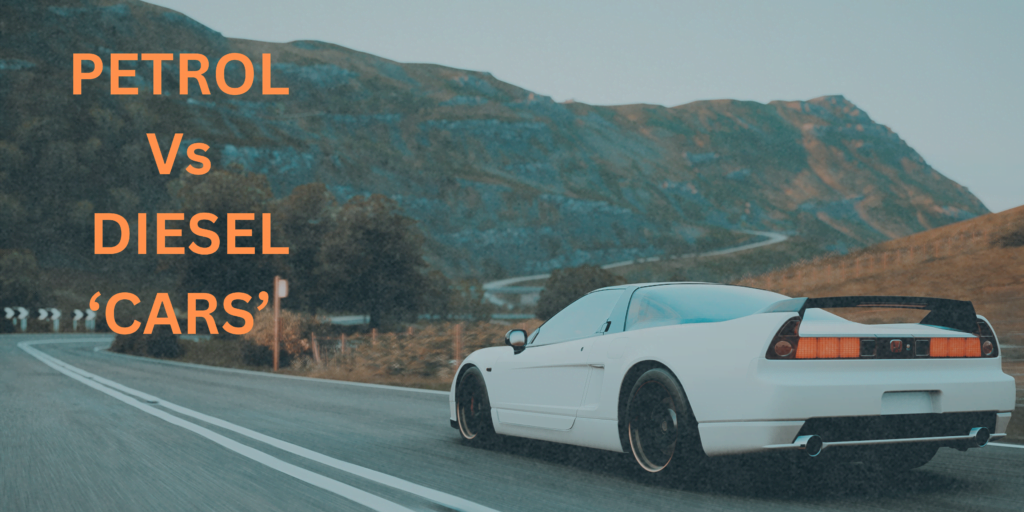
When it comes to choosing a new car, one of the most debated topics among drivers is whether to opt for a Petrol vs Diesel Car: Which Is Best Car for You in 2024?. Each type has its advantages and disadvantages, and the best choice largely depends on your personal needs and driving habits. In this blog post, we’ll delve into the key differences between petrol and diesel cars to help you make an informed decision.
Table of Contents
Understanding Petrol vs Diesel Car: Which Is Best Car for You in 2024?
| Petrol | Diesel | |
| Petrol engines use spark ignition to ignite the air-fuel mixture. They are generally lighter, quieter, and provide a smoother drive. | Diesel engines use compression ignition, which allows for greater fuel efficiency and torque. | |
| Ignition Type | Spark ignition | Compression ignition. |
| Fuel | Petrol (gasoline). | Diesel fuel. |
| Performance | Generally, offers a smooth, responsive driving experience with quick acceleration. | Delivers higher torque, making it suitable for heavy-duty applications and long-distance driving. |
| Advantages | Quieter Operation: Petrol engines tend to be quieter and less vibrating than diesel engines. Lower Initial Cost: Generally, petrol cars are less expensive to purchase than their diesel counterparts. Better Acceleration: Petrol engines usually deliver faster acceleration due to their design, making them ideal for city driving. Fewer Emissions: Petrol engines produce fewer nitrogen oxides and particulate matter compared to diesel engines. | Higher Fuel Efficiency: Diesel engines typically offer better mileage, making them more economical for long-distance driving. More Torque: Diesel engines provide more torque, which is beneficial for towing and heavy loads. Longevity: Diesel engines are built more robustly and often last longer than petrol engines. Lower CO2 Emissions: Diesel vehicles produce lower carbon dioxide emissions, which can be beneficial in terms of environmental impact. |
Key Considerations When Choosing Between Petrol vs Diesel Car
Fuel Efficiency
Petrol Cars:
- Generally, petrol engines consume more fuel than diesel engines.
- Ideal for city driving, where fuel efficiency is less of a concern.
Diesel Cars:
- Known for superior fuel economy, particularly on highways.
- The higher energy density of diesel fuel allows for longer ranges on a single tank, making diesel cars popular for long-distance travel.
Cost Considerations
Initial Purchase Price:
- Petrol cars tend to have a lower purchase price compared to diesel vehicles, making them more accessible for budget-conscious buyers.
Fuel Costs:
- Diesel fuel often provides better mileage, potentially leading to lower fuel costs in the long run, especially for frequent travelers.
Maintenance Costs:
- Diesel engines can be more expensive to maintain due to their complex design and the need for specialized servicing.
- Petrol engines usually require less frequent maintenance, resulting in lower overall costs.
Environmental Impact
Emissions:
- Petrol cars produce lower nitrogen oxides and particulate matter, making them cleaner in urban settings.
- Diesel cars emit less CO2 but produce more nitrogen oxides, contributing to air pollution.
Regulations:
- Some regions have implemented stricter emissions regulations for diesel vehicles, impacting their desirability and resale value.
Performance and Driving Experience
Petrol Cars:
- Often provide a smoother and quieter ride with quicker acceleration, making them ideal for urban driving and short trips.
- Better suited for drivers who prioritize a dynamic driving experience.
Diesel Cars:
- Deliver more torque, which is beneficial for towing and carrying heavy loads.
- Typically excel in long-distance driving scenarios, providing a stable and comfortable experience on highways.
Resale Value
- Diesel vehicles tend to hold their value better due to their popularity for long-distance travel.
- However, the increasing shift towards electric vehicles and stringent emissions regulations may affect future resale values for diesel cars.
Conclusion
Ultimately, the choice between a petrol and diesel car depends on your individual needs, preferences, and lifestyle. If you are looking for a vehicle for short commutes or city driving, a petrol car may be the best option. However, if you frequently travel long distances or require a vehicle for towing or heavy loads, a diesel car could be more economical in the long run. Consider your driving habits, budget, and environmental concerns before making a decision.
What’s trending? Check out the most sought after cars here : CarDekho: New Cars, Car Prices, Buy & Sell Used Cars in India
You might be interested in reading this post as well:
Top 20 Trending Business Ideas for Indian Entrepreneurs in 2024
Top 10 Best Places to visit during the Monsoon in India
FAQs
1. Which is better for city driving: petrol or diesel?
Petrol cars are generally better for city driving due to their quick acceleration, quieter operation, and lower emissions.
2. Are diesel cars more fuel-efficient than petrol cars?
Yes, diesel cars typically offer better fuel efficiency, especially for long-distance driving.
3. Do diesel cars have higher maintenance costs?
Diesel engines can have higher maintenance costs due to their complexity, but this can vary depending on the specific vehicle model.
4. What are the environmental impacts of petrol vs diesel cars?
Petrol cars produce less nitrogen oxides and particulates, while diesel cars emit lower CO2 levels. Both have environmental considerations worth evaluating.
5. Is it worth buying a diesel car if I only drive short distances?
If your driving is mostly short trips, a petrol car may be more economical. Diesel cars are best suited for longer journeys.
6. How does the resale value of petrol and diesel cars compare?
Diesel cars often retain their value better, particularly in markets where diesel fuel is more affordable and preferred for long-distance driving.

